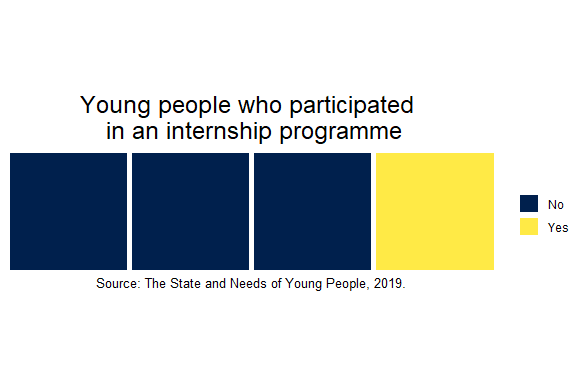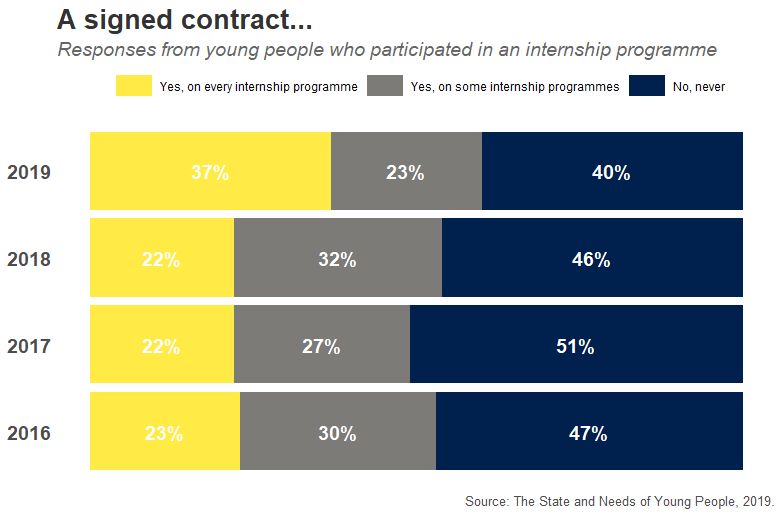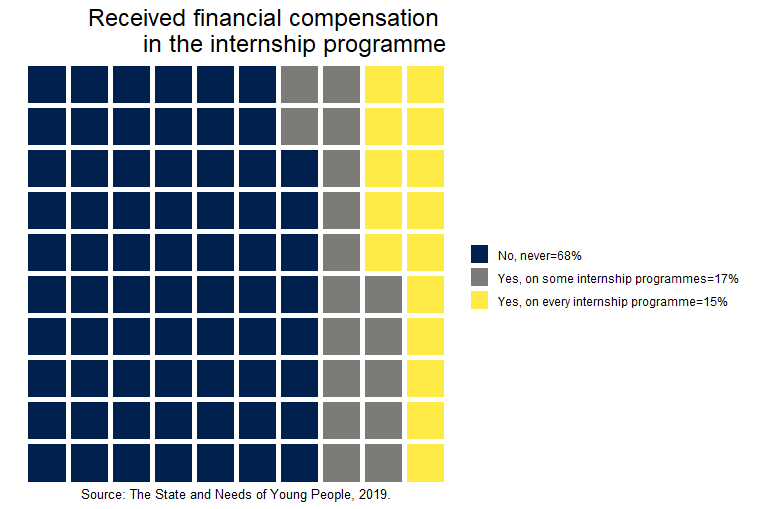aced with many challenges while entering the labour market, young people, to acquire necessary work skills, often turn to internships – short programs of acquiring work experience by learning and training. We present the most recent data collected in 2019 and 2020, which provides us with insights about the involvement of young people in internships in Serbia.
The number of young people involved in internships is steadily growing
Recently published publication “Report on the State and Needs of Youth“ for the year 2019 (Ministry of Youth and Sports), has shown that, similarly to previous years, a percentage of youth involved in internship programs is around 26%. The data also revealed that these groups: young women, youth older than 20, youth from suburban areas, and youth with higher education, more often participated in internships.
 According to the report, the number of young people in internships in the public sector is declining (41%), while, in contrast with the previous research cycle, the number of young people in internships in the private sector (48%), CSOs (7%) and international organizations (4%) is growing.
According to the report, the number of young people in internships in the public sector is declining (41%), while, in contrast with the previous research cycle, the number of young people in internships in the private sector (48%), CSOs (7%) and international organizations (4%) is growing.
On the other side, according to the data presented in a study “Youth in Serbia 2018/2019“ (Friedrich Ebert Foundation), in contrast with the previous research cycle (2015) when 41% of young people responded that they had an internship within formal education, in this research cycle, 53% of young people responded to the same question (aged 16-27).
There is a noticeable difference between this percentage and a percentage of young people who participated in internships according to the findings by the Ministry of Youth and Sports. One possible explanation of this difference may be the consequence of the different methodologies and definitions. In a Friedrich Ebert Foundation research, respondents were asked whether they had obligatory internships during schooling, while in another study whether they have participated in “internship programs“, which young people may perceive as something different from obligatory internships.
Internships were also a topic of “Alternative Report on the State and Needs of Youth in the Republic of Serbia“ by the National Youth Council of Serbia (KOMS), from 2020. According to the findings of this research, 38% percent of young people had an internship, opposite to 62% who did not. Of those who had an internship, almost half of them (46%) found it on their own, while 43% of young people found an internship within higher education.
Young people have a positive attitude towards internships
According to the Report (2019) by the Ministry of Youth and Sports, youth in Serbia have a dominantly positive attitude towards internships: 68% of young people consider internships as a way of acquiring knowledge and skills necessary for their future work. Also, about half of them (51%) think of internships as useful for finding a job.
Additionally, data from an “Alternative Report“ included a question regarding the perception of young people on the quality of internships they participated in. Young people are mostly satisfied with the quality of internships (42%). However, since 30,3% of young people reported that they were not satisfied, and 27,7% of young people were undecided, it is still important to work on including all quality elements of internships. Moreover, recent exploratory study (Pantelic, Hempel, 2020) indicated that some internships in Serbia are characterised by low learning content, limited mentoring and poor working conditions, thus reducing the benefits for young people.
More and more young people sign a contract before an internship, but still not enough
Although the Serbian legal framework does not recognize contractual obligations between an intern and an employer, there has been an increase in the number of signed contracts between them in 2019, opposite to previous years.

In 2018, from the total number of young people who participated in an internship, the percent of those who stated they signed a contract on at least one internship was 54%, while in 2019 that number increased to 60%. A contract is one of the quality elements of internships, so an increase could indicate a positive trend. However, there is still a concern regarding what type of contract do young people sign. In previous Belgrade Open School analyses, it was concluded that internships are often regulated in different contractual forms which are not appropriate – from the vocational training contract up to service contracts, temporary work contracts, volunteering, etc.
Internships are mainly unpaid
When we talk about financial compensation, even though the number of young people who did not receive compensation in any internship is alarmingly high, in 2019 there has been an increase in the number of young people who participated in an unpaid internship (from 63% in 2018 up to 68% in 2019). We do not have any data which would indicate why would this happen.

Internships are connected to higher employability
There is a positive connection between young people’s belief about finding a job and the experience of participating in an internship during school years, as it is concluded in both cycles of research studies of the Friedrich Ebert Foundation.
Not only young people who participated in an internship believed they would find a job, but they also did find a job quicker. These are encouraging findings and are in accordance with the results of other international researches. However, we should have in mind that this is correlation research, and there need to be more studies on this topic so we can have a wider picture under which conditions internships lead to greater youth employability.
From research findings towards better internship programs
Investigating internships through various surveys nowadays is an encouraging trend. Policy measures on internships should be based on data, and therefore conducting research is crucial.
This is even more important in the new environment, such as the pandemic during which a huge number of young people could lose their jobs and miss learning necessary skills for starting a career. In a newly published report from the International Labor Organization on Serbia, it is emphasized that it is important that youth employment programs which include internships are based on findings from previous evaluation studies.
In future research studies it is important to consider the following recommendations:
- Youth, CSOs and academia representatives should be involved in the research studies relevant to youth policy. For example, they should be included in the phases such as survey creation and choosing the research topic.
- Publication of (anonymized) open data sets gathered during the research should be encouraged. In that way more researchers could conduct additional data analyses that could be relevant for the creation of effective measures.
- Keeping in mind the differences between internship definitions. We should differentiate internships required by academic curricula and those which are not compulsory. Defining internships within research studies should be done in a precise way.
- In the following period, it is important to get a clearer picture of the quality of internships, both those which are compulsory and those which are not. Quality, besides contract, includes mentorship, setting the learning goals, a limited duration of the internship, adequate working conditions, and recognizing knowledge, skills, and competencies acquired during an internship. Above this, an important question is the effectiveness of internships, and especially coming up with an answer to a question under which conditions internships lead to the improvement of youth employability today.
As internships are a highly important for youth employment, BOS will continue to analyze this topic, and plan further activities following the findings.
Aleksandra Djurovic
Goran Radlovacki
